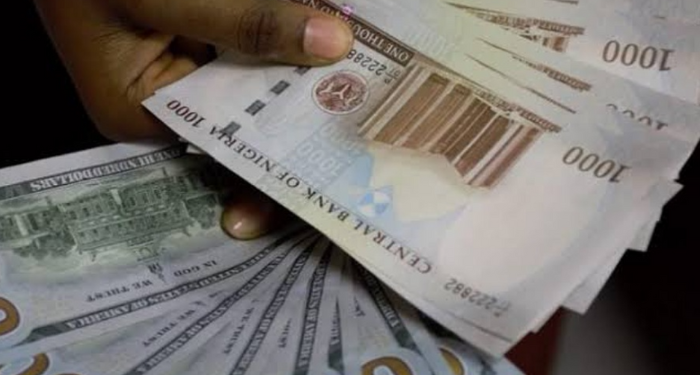The Naira experienced a sharp depreciation against the US dollar on February 19, 2024, reaching an intra-day high of N1,712.
The domestic currency depreciated by 3.78% to close at N1,598.54 to a dollar at the close of business, data from the NAFEM where forex is officially traded, showed.
- This represents an N60.58 drop or a 3.78% decrease in the local currency compared to the N1,537.96 closed on Friday.
- The intraday high recorded a record high of N1712/$1, while the intraday low was N1100/$1, representing a wide spread of N612/$1.
- According to data obtained from the official NAFEM window, forex turnover at the close of the trading was $66.43 million, representing a 21% decrease compared to the previous day.
- Similarly, the Naira depreciated against dollar in the parallel forex market, where forex is unofficially traded, with the exchange rate quoted at N1,655/$1, reflecting a 3.93% decrease from the N1,590 rate it closed at the previous day.
- Additionally, the Naira weakened against the Euro by 4.09%, closing at N1720/EUR1 compared to N1650/EUR1 reported the previous day.
- The Great British Pound (GBP) closed at £1/N2040, a decline from £1/N1,930 recorded the previous day, this marks a notable decrease of 5.39% or N110 compared to the N1,930 rate recorded the previous day.
In the cryptocurrency market where forex is sold using stablecoins, the Naira also settled at N1,717.01/$1.
Nairametrics reported that the parallel market exchange rate has experienced a significant decline, plummeting to a record low of N2040 per Great Britain Pound (GBP), driven by persistent demand pressures that continue to erode the currency’s value.
- This marks a notable decrease of 5.39% or N110 compared to the N1,930 rate recorded the previous day.
- This depreciation stands as an unprecedented occurrence, representing the lowest point in the historical performance of the Naira.
The current economic situation requires effective and comprehensive measures to address the underlying factors driving currency depreciation and inflation.























People have billions of dollars cash in the hands and so long as it is so, they will continue to manipulate the rates. The immediate solution is for CBN to issue 3 months deadline for people to return their physical dollars to the banks or lose the chance to do so while banning the BDC to buy also. This way, i can assure you that billions of dollars will be retrieved back to the system. Thereafter, all dollar transactions must be electronically transacted. This way, sanity will be restored and Naira will appreciate significantly to around N500/dollar.
That idea is fundamentally unsound. Bans rarely succeed in this context.
The pressure on the Naira stems significantly from low domestic short-term interest rates compared to potential higher interest earnings abroad in dollars and the Dollar’s rise against the Naira.
Currently, both individuals and the government are borrowing heavily in Naira to purchase Dollars, not to import capital or consumer goods, but largely as an investment strategy. They do this knowing that the interest on Dollars, combined with the Naira’s short-term depreciation, yields more profit than domestic capital investments due to lower returns for the risk, based on the prevailing domestic interest rate.
The effective solution involves raising domestic interest rates to reduce the incentive to speculate against the Naira by converting it into Dollars. This should be paired with targeted tax credits for those repatriating capital in Dollars to Nigeria for Naira foreign direct investments, and for companies financing capital expenditures through local borrowing rather than engaging in foreign exchange trading.
Offering tax credits as incentives for increased foreign direct investment and capital expenditure, along with higher short-term interest rates, presents a balanced approach. But that needs better coordination between the fiscal and monetary policy makers this country than what is being presently demonstrated.
****They do this knowing that the interest on Dollars, combined with the Naira’s short-term depreciation, more profit than the interest payable in Naira and the lower returns from domestic capital investments on a risk-adjusted basis, based on the prevailing domestic interest rate.
Even if CBN releases $1Trillion, the naira will still go down the next day, possibly N2500/$ because the commercial bank owners and the state governors are the two enemies of nigeria at moment. Anytime FG shares the subsidy money, the governors, particularly those serving their second term are planning for 2027 and they dont care if they even pay workers salaries any longer.
Thanks for the update and the insight. What about mopping up excess liquidity? i think it was a wrong policy to have shared the gains from subsidy and exchange gains as FAAC. That excess liquidity is chasing the Dollar. Uncoordinated Monetary and Fiscal Policies.